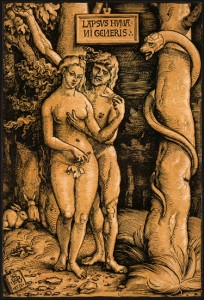Toni Morrison, best-selling novelist and Nobel laureate, was the keynote speaker for last week’s National Coalition Against Censorship (NCAC), a  non-profit group founded in 1974 to protect First Ammendment rights for journalists, authors, and artists. The subjects ranged from sex, to violence, to profanity… and why artists should be unconstrained in their usage.
non-profit group founded in 1974 to protect First Ammendment rights for journalists, authors, and artists. The subjects ranged from sex, to violence, to profanity… and why artists should be unconstrained in their usage.
Morrison is no stranger to controversy. Her novels have been frequent targets for removal from libraries because of racial, sexual, and violent content. In her presentation before the NCAC, Morrison traced our censorious tendencies to a familiar source — the Bible.
From the AP:
Morrison said the problem was fear — fear of information, dating back to the book of Genesis and the fatal temptation of the Tree of Knowledge.
“Knowledge is bad” is the Bible’s message, Morrison said, while being interviewed by author-humorist Fran Lebowitz. “It is sinful. It will corrupt you and you will die.”
And that fear still “floats around in the back of the brain,” Morrison added, noting how slaves once risked their lives to learn to read. “To know stuff is a bad thing. It has consequences, and the consequences are death.” (emphasis mine)
Don’t you just love it when celebrities start summarizing “the Bible’s message”? I must admit, in all my readings of Scripture I’ve never concluded that its message is “Knowledge is bad.” But then again, I’m not a Nobel laureate.
It’s important to note that in the story Ms. Morrison references (the Temptation in Eden), God did not ban or censure the Knowledge of Good and Evil, but only warn the Couple about the consequences of partaking (“you will surely die” — Gen. 2:16-17). If Morrison’s intent is to parallel God’s prohibitions against eating from the Tree with censorship, the comparison falters. Why? God did not remove or “ban” accessibility to said Knowledge. Furthermore, according to Scripture and Christian tradition, it was disregard of God’s commands and pursuit of the knowledge of good and evil that corrupted Man’s nature and got us into the mess we’re in. In other words, the very thing Morrison mocks (restrictions upon conduct, a prurient interest in “hidden knowledge” and “evil”) is at the root of humanity’s problems. If the Bible is true, then Toni Morrison is more like the Serpent, tempting us to eat the Fruit, than she is some trail-blazing free-speech martyr.
It is not a surprise that these intellectual elites and literary luminaries indict the Bible as hostile to our First Amendment rights. God’s Word shines a light on their beliefs and actions, so they have good reason to denigrate and misrepresent its content. But isn’t Morrison doing the same thing with Scripture that she decries being done to her own works? She’s saying, “This is bad. This is wrong. This is misleading. This confuses people. This distorts the truth.” In other words, “People should NOT be afraid of my books. But they SHOULD be afraid of the Bible.” I suppose she could suggest we ban the Bible, but then that would really be a double standard.















I think it would be cool in these cases to see Christians flood Morrison and others with a polite postcard or email campaign that basically says "I heard/read that you said X and I hope you can take some time to re-read the Bible because I don't believe that is what the Bible is saying and I hope with another look you might come to a different conclusion."
Not saying it would make a hoot of difference, but it would be a nice change from the vitriolic voices in the press. What would Morrison do if she received a half a million polite postcards or emails saying the point of the Bible is much more lovely?
Morrison's point would be an interesting foundation for a sci-fi or fantasy novel, but as far as being taken as serious historical or theological comment, I think it rings more of her resentment of her works being attacked by the Christian religious thought police.
Dear Mr. Jeff,
It seems a bit rash to send someone like Toni Morrison a postcard or email concerning her reading of the Bible. How can you possibly come up with an idea so irrational? She has a B.A. in English and an M.A. from Cornell. She knows how to read better than you or I. Plus, she wasn’t summing up the Bible; so, please do not take something and twist it to your particular liking. Mike’s post is condescending and conceited: “But then again, I’m not a Nobel laureate.” Of course, we all have the right to our own opinion. But, please, give some thought to those opinions.
You’ve disproven your own arguments.
First, Jeff made much use of the conditional mood, indicating the description of postcards was just a hypothetical idea rather than an actual serious suggestion of what should be done. You answered as if he were giving a serious suggestion, which ignores the verb forms he used. (All those “would”s are a major clue.)
Second, a person’s degrees have little to do with their ability to read, so that’s a non sequitur along with the appeal to authority. You also outright deny the explicit meaning of the universal statement Toni Morrison made (“‘Knowledge is bad’ is the Bible’s message”).
There are more such disconnects in your comment, but the point is that, unless you intended to disprove your own arguments, you might find it helpful to study verb forms and logic. 🙂